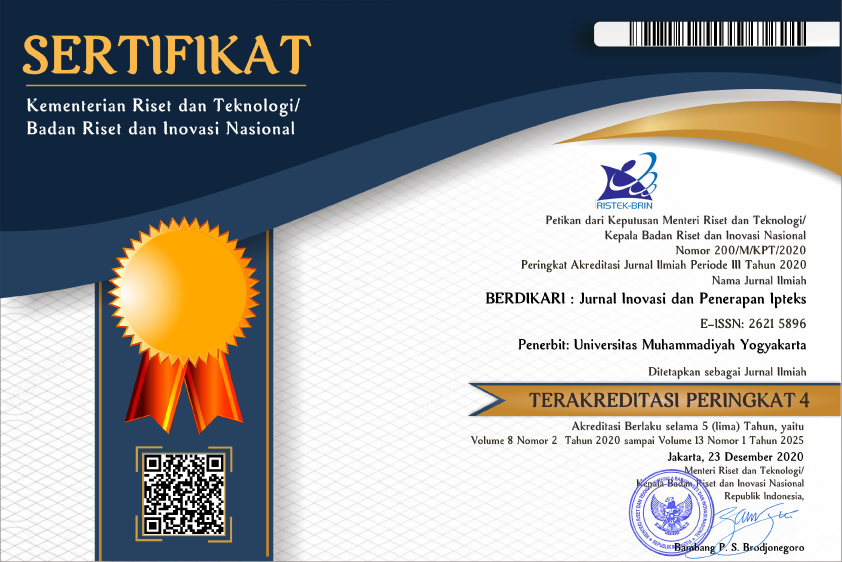Peningkatan Tata Kelola Koperasi Simpan Pinjam Pembiayaan Syari’ah BUEKA Walidah Mulia
DOI:
https://doi.org/10.18196/berdikari.v10i1.13525Keywords:
capacity, manage, performance, manager, standardAbstract
The Sharia Funding, Savings, and Loans Cooperative (KSPPS) BUEKA Walidah Mulia (BWM) is a national sharia secondary cooperative established by the Aisyiyah Central Executive Labor Economic Council. Each provincial secondary cooperative has three primary sharia cooperatives. KSPPS BWM is the parent of national cooperatives as a strategic driver in reviving and assisting secondary/primary cooperatives. The problem faced by KSPPS BWM is that the capacity of human resources (managers) in organizational governance is not standardized. The purpose of empowering KSPPS BWM is to increase the capacity of managers in cooperative governance according to Cooperative Governance Standards. The applied methods in the program were socialization, education, focus group discussions (FGD), mentoring, monitoring, and evaluation. The results of the empowerment show that the capacity of KSPPS BWM cooperative managers in terms of knowledge and skills of standard cooperative management increases. The implication of the service program is that the performance of KSPPS BWM cooperative management increases and is able to carry out the control function to better managed secondary/primary cooperatives.
References
Arifin Sitio (2011). Koperasi: Teori dan Praktik. Jakarta: Erlangga.
Arnina. (2016). Langkah-Langkah Efektif Menyusun SOP (Standard Operating Procedures). Depok: Huta Publisher.
Baswir, Revrisond. 2012. Koperasi Indonesia, Yogyakarta: BPFE.
Kasmir (2019). Analisis Laporan Keuangan. Edisi Pertama. Cetakan Keduabelas. PT Raja Grafindo Persada. Jakarta.
Konsil LSM Indonesia (2019), Standar Operasional Prosedur (SOP) Keuangan, Sekretariat: Jl. Kerinci XII No.11, Kebayoran Baru, Jakarta Selatan 12120, Telp/Fax: Website:http://www.konsillsm.or.id.
Nasution, M.Nur (2015). Manajemen Mutu Terpadu (Total Quality Management). Jakarta: Ghalia Indonesia.
Partadiredja Atje (2000), Manajemen Koperasi, Penerbit Bharata, Jakarta.
Rahmawati.A. Handari (2020), Penguatan Sistem Keuangan Koperasi Ngudi Makmur Menuju Tata Kelola Koperasi Yang Baik, Prosiding Abdimas UMY-3.
Undang-Undang Republik Indonesia Nomor 25 Tahun 1992 Tentang Perkoperasian.
Peraturan Menteri Negara Koperasi dan Usaha Kecil dan Menengah Republik Indonesia Nomor : 10 / Per / M . KUKM / IX / 2015 tentang Kelembagaan Koperasi.
Tholib Moch, Mutamimah, Ida Zahara Adibah (2020), Peningkatan Kompetensi Kewirausahaan Era Covid-19 bagi Pengusaha Aisyiyah, Berdikari (Jurnal Inovasi dan Penerapan Ipteks) Vol.9 No.2 Agustus 2021. DOI: 10.18196/berdikari.v9i2.10095
Wibowo dan Subagyo (2017), Tata Kelola Koperasi yang Baik (Good Cooperative Governance), Penerbit Buku Pendidikan, ISBN 978-602-401-752-1.
Downloads
Published
Issue
Section
License
Copyright
Authors retain copyright and grant BERDIKARI Jurnal Inovasi dan Penerapan IPTEK the right of first publication with the work simultaneously licensed under an Attribution 4.0 International (CC BY 4.0) that allows others to remix, adapt and build upon the work with an acknowledgment of the work's authorship and of the initial publication in BERDIKARI Jurnal Inovasi dan Penerapan IPTEK.
Authors are permitted to copy and redistribute the journal's published version of the work (e.g., post it to an institutional repository or publish it in a book), with an acknowledgment of its initial publication in BERDIKARI Jurnal Inovasi dan Penerapan IPTEK
License
Articles published in the BERDIKARI Jurnal Inovasi dan Penerapan IPTEK) are licensed under an Attribution 4.0 International (CC BY 4.0) license. You are free to:
- Share — copy and redistribute the material in any medium or format.
- Adapt — remix, transform, and build upon the material for any purpose, even commercially.
This license is acceptable for Free Cultural Works. The licensor cannot revoke these freedoms as long as you follow the license terms. Under the following terms:
- Attribution — You must give appropriate credit, provide a link to the license, and indicate if changes were made. You may do so in any reasonable manner, but not in any way that suggests the licensor endorses you or your use.
- No additional restrictions — You may not apply legal terms or technological measures that legally restrict others from doing anything the license permits.




